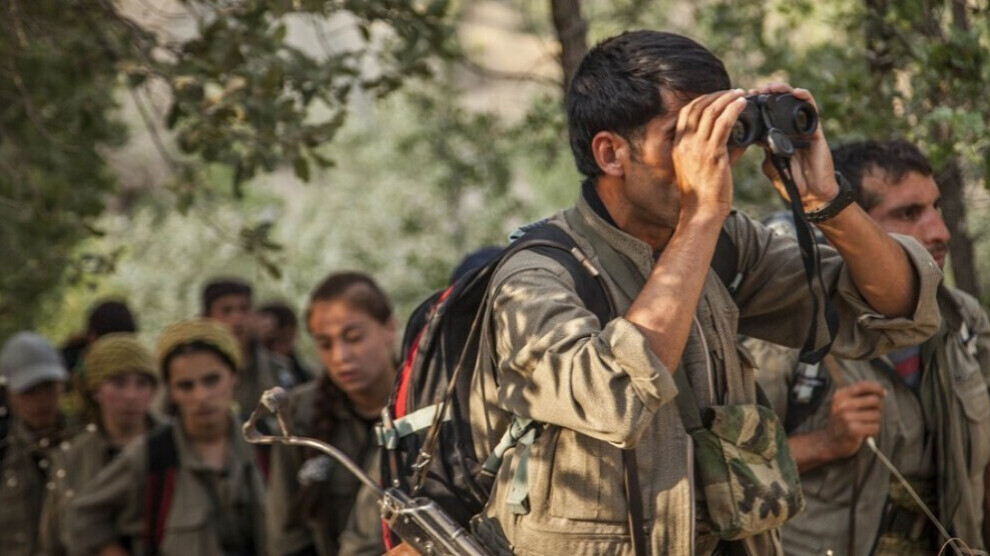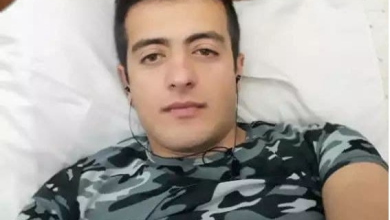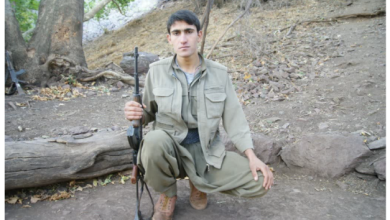Meysam Salimi: “Everything they promised vanished from day one.”
In the contemporary world, social and political phenomena, especially in volatile regions, invariably present complex issues that demand deep and precise examination. One such phenomenon is the recruitment of individuals into terrorist and paramilitary groups, which use diverse and sophisticated methods to draw young people into their ranks. Amidst this, the story of Meysam Salimi, a young man from Sanandaj who fell prey to the PJAK terrorist group, symbolizes the challenges and damages resulting from this recruitment process.
Meysam initially entered this environment with the intention of learning the Kurdish language and engaging in cultural and social activities. However, he gradually became acquainted with the group’s complex and dangerous ideologies. He was unwillingly drawn into a world where fear and threats were the primary tools for controlling and managing individuals. This text will delve deeper into Meysam’s experiences and how he transformed from a hopeful young man into a damaged individual. This story not only reflects the social and political situation of the region but also highlights the harsh realities many young people face—realities that can influence their destinies and ultimately lead to difficult and sometimes irreversible decisions.
Meysam Salimi, son of Yadollah, born on August 20, 1992, in Sanandaj, surrendered to the Piranshahr border guards on August 2, 2020, after two years of membership in the PJAK terrorist group. He told Iranian Kurdistan Human Rights Watch that he suffered significant material and spiritual damage from his membership in PJAK and despises PJAK and its leaders! An important point in Mr. Salimi’s fate is that he collaborated with PJAK before his official membership (through participation in Kurdish language classes and the Green Mountain Association).
After an individual recruited through Meysam Salimi fled the PJAK structure, the group contacted Meysam and informed him of the member’s escape. Fearing capture and imprisonment, Mr. Salimi decided to join PJAK. Finally, after two years of cooperation and association with the group, he realized the true nature and contradictions of their ideology firsthand, regretted his decision, and decided to escape. Mr. Salimi holds a diploma and currently works as a stone and tile setter.
Iranian Kurdistan Human Rights Watch (IKHRW): How and through what means did you become acquainted with the PJAK group?
Meysam Salimi: My acquaintance with this armed and notorious group was entirely indirect and gradual. Initially, through Kurdish language classes held in Sanandaj, I met people who, alongside language instruction, discussed “identity,” “cultural resistance,” and certain political issues. These classes seemed harmless on the surface, but it later became clear that they were a recruitment ground for PJAK. After some time, I also joined the so-called “Green Mountain” association. They had environmental activities, but alongside that, they put forward specific views on armed struggle and Ocalan’s ideology. Gradually, I encountered strange concepts that did not align with my young and naive mind, but they presented them in a way that made one feel they were entering a special and important path. Both the language classes and the environmental activities of that association appeared non-political; however, the way the content was presented, the side conversations of the instructors, the selection of members, and the hidden agenda were entirely for PJAK’s benefit, and I only understood these things later.
IKHRW: What led you to officially join the group?
Meysam Salimi: The truth is, my decision was not entirely voluntary. Someone I had introduced to these environments later disappeared after joining PJAK. I received news that they had escaped! After that, I received threatening calls from group members. They said that since I introduced that person to them, I had to answer for it. I was extremely scared; I thought that if I didn’t go, I would be threatened by them and perhaps prosecuted by Iranian government agencies. This fear led me to make a decision that later became one of the biggest mistakes of my life. While my biggest mistake was introducing that person to the Green Mountain environments, not even that person’s membership in PJAK, I was scared and entered PJAK.
IKHRW: During your two years in the PJAK group, what was most unbearable for you?
Meysam Salimi: Everything. From the very first day, all their promises vanished. When I entered the Qandil region, I was met with a harsh, brutal military environment. There was no trace of the “idealistic” and “egalitarian” life they advertised. There was even no respect for the environment! There was severe discrimination between Iranian and Turkish members. We, the Iranians, were forced to do harder, more strenuous tasks, and even personal tasks for the commanders. Resources were very limited; food was insufficient, clothes were unsuitable, and living conditions in the Qandil heights were unbearable for an ordinary person. In winters, the cold was bone-chilling, and many of us suffered from respiratory and skin diseases. It was truly a closed camp belonging to a terrorist cult. Protesting, criticizing, or questioning meant being labeled, detained, insulted, and tortured!
IKHRW: What were your psychological conditions like? Was it possible to communicate with your family?
Meysam Salimi: Not at all. From the moment I entered the area, all my personal belongings were taken from me; my phone, documents, anything that would allow communication with the outside world, and anything that gave me an identity, was confiscated by PJAK! No identity and no communication! We were like robots without names who had only entered PJAK to die. Psychological pressure and stress are high among PJAK members. I had no way to contact my family. This isolation caused feelings of loneliness and depression to spread among the members. I myself suffered from severe insomnia and anxiety attacks. In that environment, if someone showed psychological symptoms, they were suppressed instead of treated. Even suicides occurred among some members, but they were never allowed to leak such news to the outside. Anyone who lost their life (for any reason) became a statement that PJAK claimed was killed in Turkish attacks!
IKHRW: Did you witness any instances that contradicted the group’s principles and slogans?
Meysam Salimi: Yes, there were many instances that contradicted the group’s principles and slogans. One of the most striking contradictions was the claim of a complete prohibition on any sexual relations. The group repeatedly emphasized that any sexual contact was forbidden. However, in practice, the reality was quite different. Sexual abuses by some commanders and senior members of the group were widespread, and this issue was particularly concerning for young and newly joined girls who were targeted and had no support to defend themselves.
Furthermore, the slogans of equality and justice that the group constantly emphasized remained only on paper in reality. If anyone made the slightest protest against the behavior or decisions of the group’s leaders, they would face the harshest treatment. These treatments could include public humiliation, physical punishment, or torture and detention. The so-called “criticism and self-criticism” sessions, ostensibly held to improve the behavior and ideology of members, were in fact more like psychological torture than a correctional process. In these sessions, members were forced to confess to their “mistakes” in front of the group, even if they had committed no fault. This psychological pressure not only created feelings of guilt and shame in the members but also placed them in a vulnerable position where they easily remained under the group’s control.
It is interesting that such confessions never occurred regarding the leaders of the PKK and PJAK. No one dared to criticize the actions and decisions of Abdullah Öcalan, the group’s leader. Such criticisms and questions were in fact considered taboo, and any mention of them could have serious consequences for the individual. This power imbalance and lack of transparency in the leaders’ behavior showed the depth of corruption and duality in their promotional principles and slogans. Ultimately, all these instances showed me how an ideology can become a tool for controlling and suppressing individuals while seemingly built on human values and equality!
IKHRW: When did you conclude that you could no longer continue?
Meysam Salimi: For a while, I was constantly struggling with myself. The more time passed, the more I detested myself. I felt like I was in the wrong place. Their false ideals no longer held any meaning for me. I saw people who were killed or tortured for no reason. These things made me realize that if I wanted to save myself, I had to take a risk. I decided to escape, even if it cost me my life.
IKHRW: How was the escape process?
Meysam Salimi: One night, when I was on guard duty, I used the darkness to escape. I walked for several days in the rugged mountains, without water or food. The danger of animals, being arrested by group members, or even falling into the hands of human traffickers was always present. But none of that mattered to me; my only goal was to survive and be free. Ultimately, I reached the Iranian border and voluntarily surrendered to the Piranshahr border guards.
IKHRW: What kind of treatment did you receive after returning to Iran?
Meysam Salimi: The treatment was very humane and lawful. Contrary to the mentality created in those groups, there was no torture or harassment. The Sanandaj Revolutionary Court, after reviewing the case, sentenced me to six months in prison, but after a conditional release order, I returned home. During my detention, the conditions were completely acceptable. Some officials even tried to help me return to normal life.
IKHRW: What do you do today, and what is your perspective on the past?
Meysam Salimi: I am now working as a stone and tile setter. My life is simple, but I have peace. My past was full of mistakes and bitterness, but now I try to stand on my own two feet. I know that one should not be deceived by slogans. Today, if someone were to offer me a hundred times those promises, I would still not be willing to return to that life for even a moment. My only wish is for a calm, quiet life, far from any deception.






